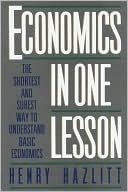More on this book
Community
Kindle Notes & Highlights
Read between
October 8 - October 19, 2021
The art of economics consists in looking not merely at the immediate but at the longer effects of any act or policy; it consists in tracing the consequences of that policy not merely for one group but for all groups.
Supply creates demand because at bottom it is demand.
the wanton destruction of anything of real value is always a net loss, a misfortune, or a disaster, and whatever the offsetting considerations in a particular instance, can never be, on net balance, a boon or a blessing.
every dollar of government spending must be raised through a dollar of taxation.
Now all loans, in the eyes of honest borrowers, must eventually be repaid. All credit is debt.
private loans will utilize existing resources and capital far better than government loans.
When we can find no better argument for the retention of any group of officeholders than that of retaining their purchasing power, it is a sign that the time has come to get rid of them.
A MERE RECITAL of the economic policies of governments all over the world is calculated to cause any serious student of economics to throw up his hands in despair.
As a postscript to this chapter I should add that its argument is not directed against all tariffs, including duties collected mainly for revenue, or to keep alive industries needed for war; nor is it directed against all arguments for tariffs. It is merely directed against the fallacy that a tariff on net balance “provides employment,” “raises wages,” or “protects the American standard of living.” It does none of these things; and so far as wages and the standard of living are concerned, it does the precise opposite.
In the long run imports and exports must equal each other (considering both in the broadest sense, which includes such “invisible” items as tourist expenditures, ocean freight charges and all other items in the “balance of payments”).
Paradoxical as it may seem to some, it is just as necessary to the health of a dynamic economy that dying industries be allowed to die as that growing industries be allowed to grow. The first process is essential to the second.
one occupation can expand only at the expense of all other occupations.
It is erroneous to conclude, therefore, that a shrinkage of production in one line necessarily means a shrinkage in total production.
It is precisely because a professional class of speculators exists to take these risks that farmers and millers do not need to take them.


